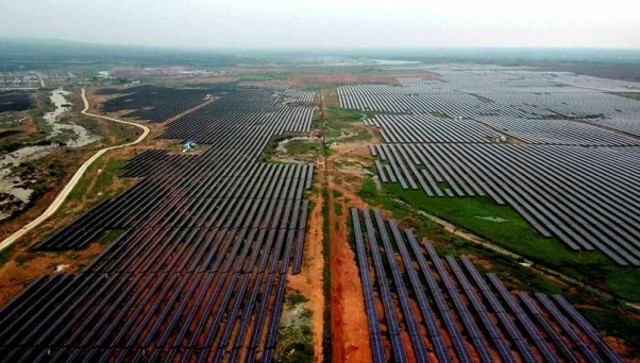While the next Jio phone caught all the attention at Thursday’s Reliance AGM, possibly the biggest announcement with the greatest potential for India went entirely unnoticed. It’s hardly surprising though, given that even as the environment impacts us more than anything else, it has the least visibility in the Indian public sphere and in the Indian consciousness. In a sense, what was announced on Thursday was the environmental equivalent of the launch of Jio — essentially the democratisation of India’s energy future and to transform it into a world leader in sustainable energy. This has far-reaching implications for the whole country. When one talks of “development”, one of the most straightforward measures of development of a country is its per capita consumption of energy (electric and fuel). Invariably low-income countries have low-energy consumption with the graph going up as income rises. Without getting into the cause-effect cycle, the main thing here is that the barrier to higher energy consumption and hence higher productivity and quality has been the cost of energy. In India, this is compounded by significant loss and significant theft ($16 billion per year) and massive unpaid dues, making the sector highly unattractive for new entrants. Unlocking the potential of solar energy This is where solar energy comes in — bypassing the entire centralised station-grid model, it allows easy scalability — adapting both large solar fields that distribute energy through grids, but also as stand-alone units. Traditionally, in India, solar power has been the driver of rural electrification, where the high costs were justified by the much-higher opportunity cost (traditional energy distributed through long supply lines) and the social justice angle. What Reliance is proposing is essentially to create massive economies of scale to significantly reduce these costs. As it stands, full solar energy set up at home can power a few air conditioners but at a significant initial cost. On the other hand, if these costs come down, the attractiveness of a solar panel replacing not just your electricity connection but also repeat payments as well as preventing any leakages or theft becomes a formidable argument. The issue is what happens at night? That’s where the announcement of new and affordable high-capacity storage batteries comes in. An easy way of thinking about this would be a simple comparison. Today, you have to apply for an electricity connection. You get it, but often you won’t because previous owners would not have settled the bills. And when you do get it, you are unsure about continuous supply, especially in peak summer. So, you buy either an inverter or a generator depending on your means. Every month you receive an electricity bill, which you still don’t know if it’s entirely yours or includes some that are being pilfered by clever wiring, and you have to pay for fuel to run the generator, which again because of moving parts can have a breakdown. Imagine replacing this with a seamless one-time payment for solar panels and high-capacity, long-life batteries. No recurring payments, no worry of breakdowns because of moving parts, no worry of theft because of a localised circuit. In effect, what it does is turn energy generation into something as ubiquitous as a mobile phone over time. Democratising access to energy While this deals with static energy generation, there were two other major announcements — eco-friendly production of hydrogen and fuel cells that can power automobiles in the future. Thus far, the problem of hydrogen had been that producing it was not eco-friendly. Modern processes have solved that problem. Similarly, the problem with the increasingly popular electric cars was that they would run out of charge after a few hundred kilometres, recharging them took time, and as the infamous Tesla case in Singapore demonstrated, they didn’t actually solve the emission problem. Far from it, EVs take up much more energy per kilometre than internal combustion engine cars do and they merely change the point of emission from car to the energy generation unit. This means if you depend on fossil energy for electricity generation, you’re actually burning a lot more fossil fuel per kilometre. Hydrogen solves all these problems — from quick refilling to not stressing the energy generation plants, to emissions, which in the case of hydrogen cars is just plain H2O or water. Considering that India spends between $110 and $190 billion a year on energy imports depending on prices, this frees up a huge part of the national budget, allowing for this money to be diverted to more useful things within the country, and for the first time promises India significant energy self-reliance in its modern history. The strategic value of making the country free of energy blackmail and its massive implications for foreign policy can’t be reiterated enough. Let’s be clear this isn’t a short-term plan — rather, it’s a 25-year one, combining demonstrated new technologies, with economies of scale and industrial heft and the ability to deliver in bulk and on time. Equally, it compensates for massive governance atrophy and inaction on the energy front over the last two decades, when the bright promise of an atomic energy revolution never materialised post-2008. The scalability built into this plan though is sheer genius — optimised for large economic units to gradually drive down costs and use the benefits of lower cost to decentralise the grids creating two parallel businesses. Make no mistake this will revolutionise the productivity of the average Indian as well as democratise access to energy and in that lies a social revolution — one pioneered entirely by responsible business. The author is a senior fellow at the Institute of Peace and Conflict Studies. Views expressed are personal.
This 25-year plan combines new technologies, with economies of scale and industrial heft and the ability to deliver in bulk and on time
Advertisement
End of Article


)

)
)
)
)
)
)
)
)



